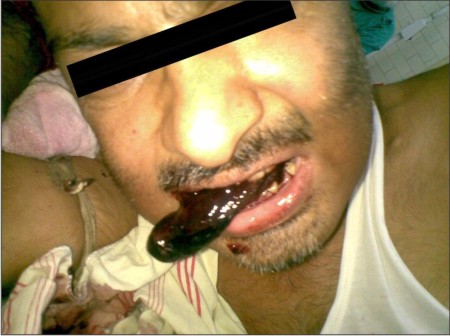Introduction
The tongue is an important part of oral cavity, which helps in taste, salivation and deglutition[1]. Due to its excellent multiple blood supply, any vascular insult is quickly overcome by the rich supply[2],[3]. The blood supply to the tongue is by the lingual artery (main artery), the ascending pharyngeal artery and the external facial artery[1]. Occlusion of any one artery is therefore unlikely to result in ischemic atrophy or gangrene[2]. Gangrene of the tongue may be caused by sudden impairment of vascularity[4], temporal arteritis[2], giant cell arteritis[5] or idiopathic[1]. We encountered an extremely rare case of gangrene of the tongue due to trauma (tongue bite).
Case Report
A 35 years old man presented in the emergency with 5 days old history of an accidental fall, which resulted in tongue bite with features of septicemic shock, respiratory distress and altered sensorium. The stitches were applied and supportive treatment was provided by a village practitioner. Three days later, the whole tongue became swollen and dark with halitosis accompanied by high grade fever. Dark colour gradually turned black (Fig 1) and patient developed difficulty in respiration. There was no past history or symptoms suggestive of cardio vascular or other chronic systemic disease. On examination, there was dyspnoea due to upper airway obstruction as the whole tongue was swollen and gangrenous. Systolic blood pressure was recorded 70 mm Hg, radial pulse rate 110 per minute and feeble. A tracheostomy was done to relieve
respiratory obstruction. After rehydration and under the cover of broad spectrum antibiotics, amputation of gangrenous tongue was done. But despite all the possible best efforts, the patient expired after few hours. Routine investigations pointed towards inflammatory pathology.
Discussion
Gangrene due to tongue bite is a rarely reported presentation though cases of tongue gangrene due to other causes have been reported in the literature. Tongue gangrene can occur due to giant cell arteritis and temporal arteritis[5],[6]. Such patients present with history of headache
 | Figure 1- shows gangrene of tongue
 |
and scalp pain in 50-70% cases. Jaw claudication and ocular manifestations are other highly specific features of giant cell arteritis. In rheumatoid hyper viscosity syndrome, the patients can develop tongue gangrene[7].These patients have features of mucosal bleed, visual symptoms and neurological symptoms besides features of rheumatoid arthritis. Tongue gangrene has also been reported in old patients receiving vasopressin therapy with underlying atherosclerotic disease[8]. Sudden impairment in vascularity due to cardiogenic shock, application of occlusive ring and ergotamine injection can lead to tongue gangrene[4],[9]. Radical neck dissection and ligation of external carotid artery followed by radiotherapy to neck has been reported as a cause of unilateral tongue necrosis[10]. Cases of even idiopathic gangrene have been reported[5]. In our case we concluded that accidental fall caused injury to tongue leading to disruption of vascularity, which due to inappropriate handling led to gangrene, oedema, respiratory obstruction, septicemia and shock with fatal outcome.
References
1. Pandey A, Saluja L, Agarwal A, Sagar KS. Idiopathic gangrene of tongue: a case report. Cases J. 2009;2:6290.
2. Brearley BF, MacDonald JG,. Temporal arteritis resulting in infected gangrene of tongue. Br Med J 1961;1(5233)1151-52.
3. Dutta T, Vasudevan K. Gangrene of tongue following self-application of a rubber band. Br J Surg 975;62(12):956.
4. Roman BR, Immerman SB, Morris LG. Ischemic necrosis of tongue in patients with cardiogenic shock. Laryng 2010;120(7):1345-9.
5. Zadik Y, Findler M, Maly A, Rushinek H, Czerninski R. A 78-year old woman with bilateral tongue necrosis. Oral Surg, Oral Med, Oral Pathol, Radiol and Endod 2011; 111(1):15-19.
6. McGill RJ. Gangrene of tongue. Br Med J 1961;1(5239):1610-11.
7. Pfeiffer J, Ridder GJ. Spontaneous tongue necrosis consecutive to rheumatoid hyperviscosity syndrome. A case report and literature review. Laryngorhino 2008; 87(1):43-8.
8. Zelch MG, Geisinger MA, Risius B. Tongue necrosis after intraarterial vasopressin therapy. AJR Am J Roent 1985;144:1283-1284.
9. Wolpaw JR, Brottem JL, Martin HL (1973) Tongue necrosis attributed to ergotamine in temporal arteritis. JAMA 1973; 225(5):514-515.
10. Gault DT . Tongue necrosis after radical neck dissection. Head Neck Surg.1988;10:344-345.
|